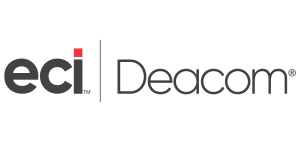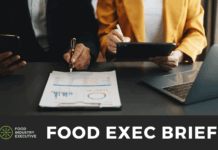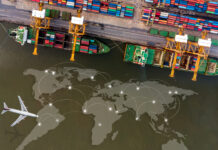
Article sponsored by: Deacom ERP, an ECI Software Solution
According to McKinsey research, before 2020, consumer demand for food in the United States had been stable, growing at a consistent pace of 4% in each of the previous five years. The supply was dependable and predictable. Retail and food services had a roughly equal share of sales until the pandemic struck. Lockdowns and physical distancing forced consumers to eat more at home, which caused an increase in grocery sales and a decline in revenues at dining locations.
At the same time food and beverage manufacturers and distributors were dealing with fluctuating consumer demand, they also faced bottlenecks at ports, severe labor shortages in the trucking industry, layoffs, factory shutdowns, production cuts, and COVID-19 outbreaks. These conditions produced cascading effects, including scarcities in raw ingredients, extended production lead times, rationing among distributors, and retail outages.
The COVID-19 pandemic caused 4,200 disruptions in the first nine months of 2020, making it the most disruptive event in modern supply chain history, according to Resilinc’s Eventwatch risk monitoring system. By McKinsey’s projections, all companies can now expect major supply chain disruptions to become more common, with disruptions lasting a month or longer every 3.7 years.
The pandemic exposed a lack of flexibility in the global food supply chain. Confidence among consumer products organizations (including food and beverage producers) in their supply chain’s resilience now stands at just 23%, per Capgemini research.
Food and beverage companies aren’t standing still. They are actively investing in technology tools to strengthen and automate their supply chain and inventory management practices to ensure that they can deliver exactly what is necessary to meet consumer demand no matter the operating environment. But while supply chains are becoming increasingly splintered and calculations more complex, much smarter tools are needed. Day-to-day supply chain issues necessitate constant oversight, and increasingly complex geographical and regulatory issues make it harder to stay on track, even as the pandemic subsides.
Intelligent technologies like enterprise resource planning (ERP) solutions figure to be at the core of food industry supply chain resilience. But what can ERP software do to offset challenges that are so external to a business? Plenty. Here, we take a look at how ERP helps food enterprises to become more resilient:
Gain a holistic view of your supply chain
An ERP solution integrates all aspects of operations and the wider supply chain with dashboards and monitoring tools. When problems do arise, leaders have the foresight and visibility necessary to respond in time rather than react too late. ERP enables leaders to create new recipes and BOMs, adhere to regulatory requirements, track lots forwards and backward, leverage EDI capabilities, and automatically generate documents. Different business modes enable management as a contract manufacturer, co-packer, or producer.
Planning in siloes, even when best practices are implemented in each department, results in disparate data systems, inaccurate information, and miscommunications. ERP offers one integrated source of real-time data with a consolidated view of the supply chain and transparency across the business. ERP delivers efficient planning and scheduling based on accurate, real-time data. Streamlined invoicing and workflows with full data visibility ensure strong supply chain management, regardless of external disruptive forces. Cross-departmental integration and visibility are also essential to document regulatory and compliance records in many manufacturing sectors.
Reduce manual purchasing with automation, monitoring, and alerts
An ERP solution enables companies to avoid paying too much, ordering too much or too little, or ordering too soon or too late. It improves the accuracy of demand forecasting based on historical trends. It keeps a business organized as it integrates more suppliers. Software automates or streamlines the selection of the right suppliers at the right times, avoiding risks. If a supplier is in a snowstorm or a pandemic hot spot, the system provides alerts and orders are diverted to a supplier that isn’t at risk. ERP also monitors and integrates any changes to a job with suppliers, so that if job specifications change, a switch on the fly to the best available supplier is automated. This further improves the accuracy of supply forecasting and helps determine which suppliers and carriers can best meet budgets and deadlines. One of the keys is working with local suppliers. Less distance between a business and its suppliers results in decreased risks during disruptions.
With more disruptions expected in the years ahead, relying on a short list of suppliers, including some that may be short-staffed or use limited suppliers of raw materials, is a plan bound to fail. These ERP features help to automate diversification of your supplier network and contingency planning. Visibility and insights into suppliers’ performance over time provides continual incremental improvement, which is the larger key to reducing the impact of disruptions and increasing supply chain resilience.
Streamline your operations
A food and beverage industry-tailored system can streamline your business in a variety of ways. Advanced trace and recall features let you identify where raw materials and packaging came from, enabling quick action on recalls. Automated regulatory compliance features eliminate the need for manual records and data storage in disparate systems. Forecasting features enable exploration of different production scenarios as variables change to identify the most cost-effective solutions. Real-time costing features analyze margins in real time and proactively make the necessary pricing adjustments, and transportation optimization features analyze logistics, resulting in more cost-effective delivery plans.
Conclusion
Significant disruptions are becoming increasingly common in the food and beverage industry, but you can minimize their impacts with an industry-specific enterprise resource planning solution. With ERP, your leaders are equipped to make the right decisions at the right times to keep your supply chain resilient and on track, regardless of disruptions in the external environment.






